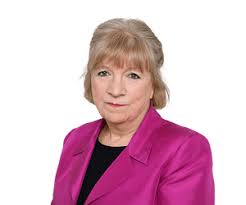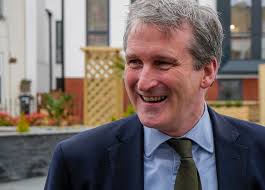Work TV
Watch our TV Channel dedicated to the ‘World of Work’. Explore our video library for informative videos featuring career opportunities at leading companies, franchising opportunities, further education and recruitment professions and their services.
Simon Collyer
Housing and Regeneration Minister Rebecca Evans, Criticizes Universal Benefit Effects to The Secretary Of State For Work And Pensions
Housing and Regeneration Minister Rebecca Evans has written to the Secretary of State for Work and Pensions to warn about the impact Universal Credit is having on some of the most vulnerable people in Wales.
Rebecca Evans said:
“Foodbank use in areas where Universal Credit has been rolled out has increased by 30% according to National Audit Office statistics, compared to a 12% increase in non-Universal Credit areas. This is extremely worrying.
“A Universal Credit claimant survey from Esther McVey’s own department shows that four in ten claimants were experiencing financial difficulties, and that 46% of new Universal Credit claimants need help to make their claim online.
“I have asked the Secretary of State to make Universal Support for people who claim Universal Credit available as widely as possible to help those people who are experiencing difficulties in managing their finances, and for those who are struggling with digital access.
“The recent National Audit Office report was clear; local authorities, housing associations and landlords are all seeing an increase in rent arrears since the introduction of Universal Credit.
“This chimes with many concerns raised and reported to me by the housing sector in Wales.
“The National Audit Office highlighted that the system is lacking in ways to identify vulnerable people, which makes it difficult to see how they are getting the right support, from the outset when they apply for Universal Credit. I have asked the Secretary of State to explain how she plans to rectify this.
“People who are more vulnerable can be offered alternative payment arrangements through Universal Credit, but we are seeing real inconsistencies in the way this is offered to claimants; the Department of Work and Pensions’ own claimant survey indicated that as many as 48% of those surveyed had to request this themselves, rather than being offered it proactively.
“I am deeply concerned about the flaws of Universal Credit, and its impact on the most vulnerable people in Wales, and I will continue to press the UK Government on addressing these.”
ABC Comment, Have your say below:

John Major Warns of Poll Tax Style Riots Potentially Caused by Universal Credit
Former Conservative Prime Minister Sir John Major has criticised the government's key welfare reform, saying it could cause the Tories the same problems as the poll tax in the 1980s.
On Wednesday, another former prime minister, Labour's Gordon Brown, also attacked the scheme, calling for it to be put on hold.
The current Labour leadership has gone further and vowed to scrap it.

Image: Health Minister Jackie Doyle-Price.
The appointment of a ‘Suicide Minister’ - Health Minister Jackie Doyle-Price by Theresa May, is being treated with derision due to the large numbers of people who have killed themselves while on benefits, particularly, disability benefits. 4,500 people take their own lives every year.
ABC Note: Poll Tax style riots are unlikely in the United Kingdom because of the age demographic.
ABC Comment, have your say below:

Bill to Protect Tenants Gets Second Reading
Yesterday the second reading of the tenant fee bill was delivered in the House of Lords outlining the measures the Government is going to take to create a fairer playing field for landlords and tenants in the UK rental sector.
With a focus on unfair letting fees and the requirement for agents to join a client money protection scheme, it will look to help tenants overcome the initial financial barrier of securing a rental property.
Adam Male, Director of Letting at Urban.co.uk, commented:
“Today's progression of the tenant fee bill was a step in the right direction for transparency and professionalism in the lettings sector, but a step in the wrong shoes. It will no doubt see those it aims to penalise recoup lost revenue under another guise at the expense of both landlords and tenants.
The bill is sure to bring protest from much of the traditional lettings market, but the fact of the matter is, they’ve made a rod for their own back through the exploitation of tenants via below the belt fee charging.
Our previous research found that traditional letting agents were getting away with extortionate charges such as £200 to change a surname on an agreement, £40 if you weren’t married to your significant other or an additional £90 to move in on a Saturday.
The unfortunate reality is that this isn't the solution and these bad apple agents will always find a way around the introduction of restrictive legislation.
The silver lining is that tenants will at least have more stability and security around their financial commitments and won’t be at the mercy of immoral, out of the blue fee charges.”
ABC Note:
A bill must go through the following steps (in both Houses) to become law:
- First reading: Bill arrives.
- Second reading: Main debate on purpose and key areas of the bill.
- Committee stage: Detailed line by line scrutiny of the text with amendments (proposed changes). Votes may take place to decide whether to make the changes.
- Report stage: Further examination of the text. More amendments are debated and further votes take place to decide whether to make the changes.
- Third reading: A ‘tidying up’ stage. Final chance for amendments and votes.
- Each House considers the other’s amendments.
- Royal Assent: When both Houses agree the final content, a bill is approved by the Queen and becomes a law or ‘Act of Parliament’.
Amendments (changes)
Lists of amendments are suggested, or ‘tabled’, by members and discussed in detail during committee, report and third reading stages. The ‘marshalled list’ shows each amendment in the order it affects the text of the bill. Amendments are often grouped by theme before each debate.
After an amendment has been discussed the government signals whether it will accept or reject the proposal. If the government does not intend to accept the amendment the member who suggested it can either withdraw it or call a division (vote).
ABC Comment, have your say below:

International Stress Awareness Week 5th - 9th November, Theme -: Does High-tech Cause Hi-Stress?
International Stress Awarness Week kicks off soon
ISMA will celebrates Stress Awareness Day's 20th anniversary, they are going to devote the whole week 5th – 9th November to reducing the taboo associated with stress and mental health say the organisers. Take a look at WHAT’S ON guide here.
International Stress Management Association will update their list of events throughout the UK and around the world as they come in and post them on the site so you can see what is going on and where.
The theme for 2018, Does Hi-Tech Cause Hi-Stress - will look at two sides of technology: on the one hand, the stressful effects of the 24/7 lifestyle that technology has brought, and on the other, the positive contribution that technology can make, helping us manage our lives better. There is no doubt that technology impacts on all our lives, and it is appropriate that ISMA is involved in a debate about the positive and the adverse effects it can have, and how we can all use technology to our advantage.
Ending the stigma associated with stress and mental health is an organisational imperative and ISMAUK’s focus for 2018 will continue to be to ensure that these issues remain high on the national agenda together with the promotion of wellbeing in the workplace.
National Stress Awareness Day's 20th Anniversary Year!
Here is whats on:
-Monday 5th November: Stress Fair: Virgin Active Health Club, London, EC2. From 5-8 p.m.
-Wednesday 7th November: All day Global on-line stress summit. Sign up here.
-Wednesday 7th November: All day national stress helpline.
-Friday 9th November: One day annual Stress Conference, Royal Over-seas League,
St. James's, London, SW1. Book here.

Image: Carole Spiers, ISMA Chair.
ABC Comment, have your say below:

Study Finds Young People Turning Away from Booze
The front page of the Times splashes on the revelations that a third of 16-24 year old spurn drinking alcohol.
Nearly 30% of young people in England do not drink, study finds
The survey of 10,000 young people also found that the proportion who had never tried drinking has doubled over the past decade.
Analysis of the study, published in BMC Public Health, underlined that the "trend is widespread". One researcher said "We find it among higher and lower income gropus, in the north and south, in villages and cities."
In other news, the Daily Telegraph leads with the story that the Royal College of Psychiatrists is reconsidering its opposition to decriminalising cannabis.
Dr Adrian James, who will sit on a newly-formed RCP panel, said they would start with an "open mind", as they review evidence from US states, Portugal, and other places where decriminalisation has taken place.
However, Dr James underlined that he remained wary of the risks of psychosis particularly associated with high-strength forms of the drug.
ABC Comment, have your say below:

World Mental Health Day 2018
Today is World Mental Health Day One in four people in the world will be affected by mental or neurological disorders at some point in their lives.
According to the World Health organisation, Adolescence and the early years of adulthood are a time of life when many changes occur, for example changing schools, leaving home, and starting university or a new job. For many, these are exciting times. They can also be times of stress and apprehension however. In some cases, if not recognized and managed, these feelings can lead to mental illness. The expanding use of online technologies, while undoubtedly bringing many benefits, can also bring additional pressures, as connectivity to virtual networks at any time of the day and night grows. Many adolescents are also living in areas affected by humanitarian emergencies such as conflicts, natural disasters and epidemics. Young people living in situations such as these are particularly vulnerable to mental distress and illness.
Half of all mental illness begins by the age of 14
Half of all mental illness begins by the age of 14, but most cases go undetected and untreated. In terms of the burden of the disease among adolescents, depression is the third leading cause. Suicide is the second leading cause of death among 15-29-year-olds. Harmful use of alcohol and illicit drugs among adolescents is a major issue in many countries and can lead to risky behaviours such as unsafe sex or dangerous driving. Eating disorders are also of concern.
Growing recognition of the importance of building mental resilience
Fortunately, there is a growing recognition of the importance of helping young people build mental resilience, from the earliest ages, in order to cope with the challenges of today’s world. Evidence is growing that promoting and protecting adolescent health brings benefits not just to adolescents’ health, both in the short- and the long-term, but also to economies and society, with healthy young adults able to make greater contributions to the workforce, their families and communities and society as a whole.

Image: Depression can start at a young age.
Prevention begins with better understanding
Much can be done to help build mental resilience from an early age to help prevent mental distress and illness among adolescents and young adults, and to manage and recover from mental illness. Prevention begins with being aware of and understanding the early warning signs and symptoms of mental illness. Parents and teachers can help build life skills of children and adolescents to help them cope with everyday challenges at home and at school. Psychosocial support can be provided in schools and other community settings and of course training for health workers to enable them to detect and manage mental health disorders can be put in place, improved or expanded.
ABC Comment, have your say below:

No Grants For Companies Under-paying Workers in Scotland Says SNP Conferance
The SNP conference congratulates the SNP Scottish Government on their recent announcement, that paying the real Living Wage will be included in the criteria for the award of job-related public sector grants, as part of its Fair Work policy.
Conference notes that this policy, alongside pressure from others, has already shown an impact, with Amazon having announced that they will raise their minimum wages in both the USA and the UK.
The SNP conference believes that no large commercial organisations should be eligible for public sector grants, while their workers remain reliant on payments from our Social Security system, and calls on other large commercial organisations to ensure all workers are paid the real living wage.

Also at the conferance:
UNIVERSAL CREDIT
The SNP Conference notes the nationwide roll-out of Universal Credit and that its phased introduction began in Glasgow in September.
Conference notes the shocking figures in the 2018 Annual Report on Welfare published on 1 October showing that, in its first year, the two-child cap has reduced the incomes of around 3,800 Scottish families – and understands 50,000 households in Scotland will eventually be affected.
The SNP Conference calls on the Tory UK Government to halt the Universal Credit system in its upcoming budget, announced for 29th October, until it is fit for purpose, including scrapping the two-child cap and the rape clause, reducing the 5-week delay in first payments, changing the minimum income floor for self-employed people and introducing split payments, twice monthly payments and direct payments to landlords as standard.
ABC Comment, have your say below:

Will Quince MP Takes Forward our Complaint
Dear Will Quince MP, Thank you for your response today. I also received a hand written note from, Polly Toynbee (Guardian Journalist) this morning, wishing me well with this campaign. This was extremely kind of Ms Toynbee and very encouraging. I have struck a chord with teachers who are incensed in some cases.
If school children are going to be used to promote offers to parents, then these offers need to be vetted and other vendors need to know this route to customers is available. The school children have to bring back the leaflet even if the box requesting a Course Advisor (high pressure salesman’s) visit is not ticked.
Parents who cannot afford extra tuition for their children are therefore being embarrassed in the eyes of their child, and it does not seem right that children are being introduced to (educational) inequality at such a young age?
I really thank you for your letter, and I hope you do not mind, but I have attached it and sent it to the magazine editors I have talked to (and these other contacts) and I hope it might find its way to Kevin Courtney and Mary Goosestead, joint chairs of the National Union of Teachers?
Continued.......

Image: The Guardian columnist, Polly Toynbee.

This is what is said in the media about Exemplar Educations sister Company, The Student Support Service
Complaint articles:
Guardian: https://www.theguardian.com/education/2011/may/10/parents-protest-promotion-home-tuition
Mums Net: https://www.mumsnet.com/Talk/primary/1612237-Has-anyone-any-experience-of-The-Student-Support-Centre

Image: Rt Hon Damien Hinds MP, Education Minister.
ABC Note: Our campaign to stop companies like Exemplar Education using school children to promote expensive home tuition courses is gaining traction. Parents get locked into loan aggrements they cannot get out of despite changing circumstances. We await news from the Minister for Education the Rt Hon. Damien Hinds MP.
ABC Comment, have your say below:

Pension Tax Relief - Possible Budget Target for Phillip Hammond
Philip Hammond is going to have to find the cash to cover the spending announcements - that minor matter, the extra £20 billion for the NHS could come from pensions tax relief — which currently costs £35 billion a year.
Pension Tax Relief could be targeted, with the amount people can save tax free likely to be cut, along with the threshold for higher earners.
In an interesting move, the Chancellor has announced an earlier than usual date to deliver his annual Autumn Budget. On 29 October the Chancellor will outline his vision for the UK economy.
This is a challenging time to be setting budgets. Coming after the October EU Summit, but ahead of potentially two more dates in the diary for further Brexit discussions with the EU, how much certainty will the Chancellor have to allow him to use this opportunity to reset the country’s fiscal policies?
ABC Comment, Have your say below:

Families in the UK Labour Market
The employment rate for mothers increased from 68.9% to 74.0% between 2013 and 2018, according to new figures released today by the Office for National Statistics.
Half of mothers (50.5%) work 30 or more hours a week compared with over two thirds (69.7%) of women without dependent children. In Q2 2018, almost three-quarters (72.5%) of families where both parents lived together had both parents in employment with almost half (45.5%) of these families having both parents in full-time employment.
The South West was the English region with the highest percentage of mothers in work (79.7%), while London had the lowest percentage of mothers in work (65.8%).
ABC Comment, have your say below:
























